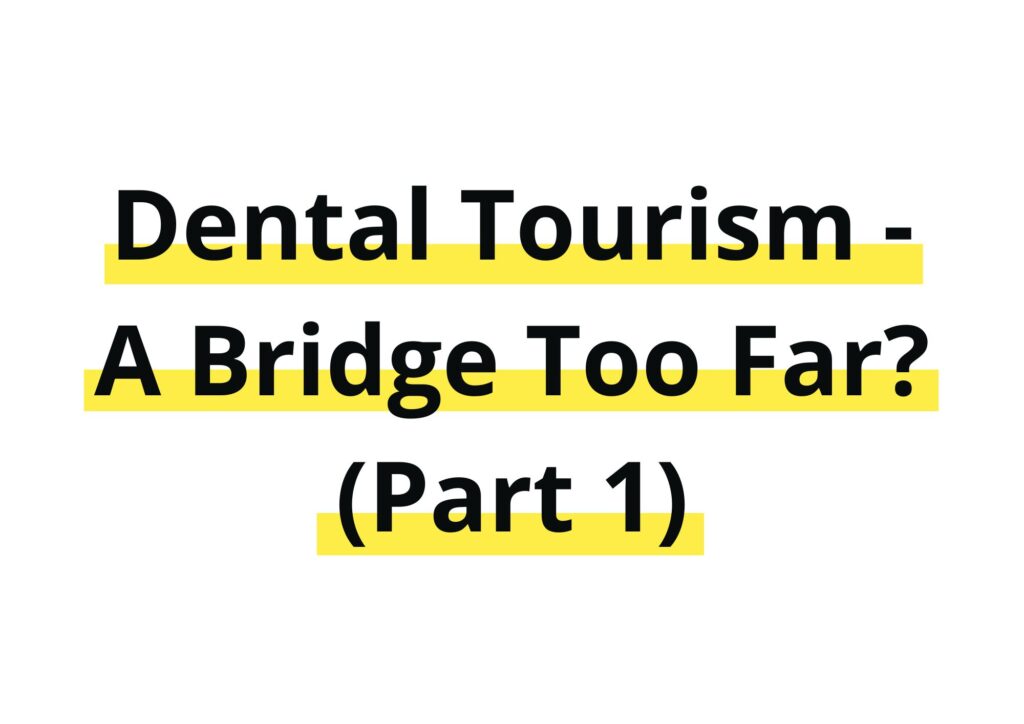

By Leanne.
Share article:
Are you ready for that overseas holiday?
Did you book your whale watching adventure?
Your relaxation massage?
Your ‘Full Arch All On X dental surgery? Wait … what?
That’s right!
Dental Tourism means travelling to another country for a holiday and incorporating (often) complex dental work.
Sounds far fetched right? Nope, It’s a thing!
Is it a good idea? Well, not so much!

Dental tourism, has both good and bad sides to it. On the one hand, the lower treatment costs along with a vacation are the attraction, (Ironically you will not be feeling like sipping cocktails by the pool) on the other hand there can be many safety risks associated with it.
People seeking dental tourism overseas or abroad, can often be found heading to the following countries.
- North America: Mexico, Costa Rica, Guatemala
- Australia: India, Philippines, Thailand, Vietnam, Indonesia
- UK/Europe: Croatia, Hungary, Italy, Turkey
The high cost of dental treatment at home is the main reason that people are exploring dental procedures abroad/overseas.
Here are some of the reasons behind the difference you pay for dental work overseas, and the price you pay for dental work in countries like Australia, the UK or the USA:
- The set-up costs and wages paid to Dentists and their clinical staff in AU/USA/UK are much higher than those paid to Dentists overseas, which leads to a higher expense behind the cost of your procedures.
- Sterilisation procedures are far more thorough, so you can be comfortable with the safety of your treatment. Our Dentists are also heavily monitored, and we have strict follow-up procedures through complaints commissions, dental boards and courts, that will assist you with the investigation of any negligence with the results of your procedure.
- The cost of living is much more expensive – Dentists pay a lot more for a cleaner environment for your dental work to be performed.
- Manufacturing work is far more expensive – our Dentists pay much more for their tools, technicians and laboratory costs, meaning the outcome of these procedures can be far more efficient than those performed overseas.

Let’s look at Dental Tourism
You’ve heard about John’s sister’s boyfriend’s cousin’s best friend who had her veneers done for 1/3 of the cost in Vietnam right? And says she’s ‘happy as Larry.’
While Larry on the other hand, is recovering from a botched procedure in Mexico (but that’s another story). There are many success stories and many not so happy or healthy outcomes to be found online on dental forums and websites.
But remember when things go wrong you could find yourself alone and helpless.
What are the dangers of Dental Tourism?

Poor Dental standards – The quality of dental treatment you’ll receive abroad can vary from country to country. Only quality dental materials approved by the Therapeutic Goods Administration (TGA) are used in Australia. In the USA, sterilisation rules are governed by OSHA, and the FDA regulates materials, and in the UK the General Dental Council (GDC) is the governing body. Not all overseas Dentists have received the amount of training that AU/UK/USA Dentists have, or potentially have the same level of experience.
Ongoing dental care – It can be quite difficult to receive ongoing dental care if you go overseas. If you receive dental care in another country, the foreign dentist might not know your dental history. When you return, your own dentist might not know what treatment you received or why it was performed. Most importantly they may not be able to help you if things go wrong.
Language barriers – There is a high risk of miscommunication between the patient and the dentist which can lead to inconsistent results. Check that the procedure you’ve consented to and the procedure to be performed are one and the same.
Get everything in writing.


If you can find someone to fix it, that is.
Increased risk of complications and infections especially in more complex dental treatments such as implants and root canals.
As you are on a holiday, your treatment may be performed in a limited timeframe. This may mean it is rushed, when complex dental work should definitely not be rushed. You also may not receive all the follow-up appointments or after-care that you require before you return home.
There may be insufficient time for the mouth to heal and this can cause infections if not treated properly.

Dental Tourism Agencies

You only need to browse the web for a plethora of agencies advertising dental holidays. When you read deeper, these agencies that organise your treatment and travel make it clear they’re only providing the tools and information to allow you to make the final choice. One such agency clearly states: “We will not encourage, advise, advocate or underwrite any of the doctors or healthcare facilities in our network. The final choice is completely yours.”
These agencies will organise your flights, accommodation and even sightseeing.
(But not your travel insurance, in case a procedure goes wrong).

If you decide to seek treatment overseas, you’ll probably be going it alone. It’s unlikely you’ll be able to get travel insurance for the procedure, and there are often no clear avenues to complain if you aren’t happy with the work.
Travel insurance may not cover accidents that occur during a dental holiday. If you develop an illness due to the procedure, your coverage may not be of any use to you….Beware.
To be continued…

Disclaimer: The information provided on this platform, including text, graphics, and images, is intended for general informational purposes only. It is not a substitute for professional dental advice, diagnosis, or treatment. For specific dental concerns, it is crucial to consult with a qualified dental practitioner. They will be able to assess your individual circumstances, provide accurate diagnoses, and offer appropriate treatment options tailored to your specific needs
Print article:
Share article:
Subscribe To Leanne's Blog
Ready for your new smile?


